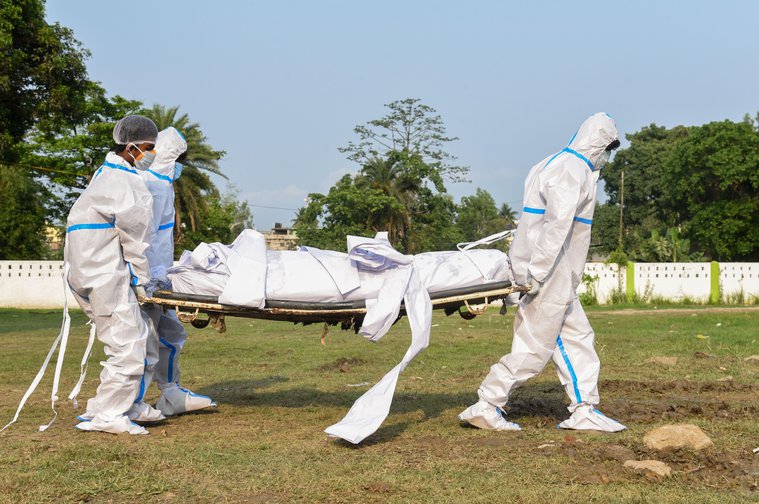It’s the EU again. It’s Germany again: New research reveals how Brussels puts companies’ profits ahead of millions of people’s lives worldwide
Kenneth Haar is a researcher and campaigner with Corporate Europe Observatory
Olivier Hoedeman is a researcher and campaigner with Corporate Europe Observatory
Hans van Scharen is based in Brussels and works as freelance journalist and media officer for Corporate Europe Observatory.
Cross-posted from Open Democracy

The European Union is now the main obstacle to a global deal to waive intellectual property rights on COVID vaccines, medicines and diagnostics.
Temporarily waiving intellectual property rights via the World Trade Organization’s Agreement on Trade-Related Aspects of Intellectual Property Rights (TRIPS agreement) would be a crucial first step in boosting production of COVID-19 vaccines – and getting them into the arms of billions of people outside the Global North.
India and South Africa proposed the measure to the WTO last October, and it has since gathered support from more than 100 low- and middle-income countries, as well as a global civil society movement backed by Oxfam International, the director of the World Health Organization, Tedros Adhanom Ghebreyesus, and even the Pope. After initial opposition, the US is now backing a temporary suspension of intellectual property rights, albeit only on vaccines and not medicines, and the WTO has agreed to debate the waiver.
The EU is increasingly looking like the villain of the world. And now even one of its own key institutions, the European Parliament, has flipped.
There are three decision-making bodies at the EU: the European Parliament, which is the only one whose members are directly elected by citizens; the European Commission, which proposes legislation and manages the day-to-day business of the bloc; and the European Council, which is made up of member states. The Commission and the Council are stubbornly opposing the waiver, with the Commission submitting an alternative plan to the WTO that includes such flaccid proposals as limits on export restrictions and voluntary licensing of patents.
Back to bite Europe
But on Wednesday, European parliamentarians voted in favour of a resolution to back the waiver, leaving the Commission and Council increasingly out in the cold. MEPs passed the resolution with 355 in favor, 263 against, and 71 abstentions, according to the results announced on Thursday.
In contrast, the Commission’s plan firmly excludes any attempt to suspend the monopoly on vaccines and medicines held by Big Pharma – even when the EU and its member states have spent about €3bn of public money to support vaccine development. This is in direct opposition to the text of its own June 2020 agreement on the joint procurement of vaccines, which states that “the Commission will promote a COVID-19 vaccine as a global public good” and that it will “include access for low and middle income countries to these vaccines”, especially as the vaccines have “been developed with public support”.
Experts warn that without global solidarity action, and soon, the virus will be able to mutate into more aggressive variants and come back to bite Europe. The question is: why is the EU taking such a hardline position against COVID vaccine patent waivers?
Well, as the former Irish president, Mary Robinson, said last week: “I think the EU reluctance is because the pharmaceutical industry is strong and has been vocal on this issue.”
As European commissioners and heads of state argue that “now is not the right time” for patent waivers, or that waivers won’t solve the problem, what this really means is simple: the Commission and Council are prioritising the interests of European capital over everything else, even if this risks the lives of billions of underserved populations. In this case, European capital means Big Pharma, which includes companies such as BioNtech and AstraZeneca.
A new study by the research and campaign group, Corporate Europe Observatory, has revealed that Big Pharma spends at least €36m a year to lobby the EU. The industry employs 290 lobbyists to push for its interests in Brussels, not including so-called hired gun lobbyists at lobby consultancies.
And the EU listens. Since March 2020, European commissioners and their cabinets have met members of the pharmaceutical industry 161 times on matters including the production and distribution of vaccines. In this timeframe, they only managed to squeeze in one meeting with an NGO in favour of the waiver.
No wonder the Commission’s position is impossible to distinguish from that of EFPIA, the biggest pharma lobby group in Europe. And no wonder the Commission and Council are doing everything they can to keep the public in the dark when it comes to the vaccines.
More than a year after the start of the pandemic, key information is still being kept secret, including the full vaccine contracts, the way that negotiations were executed, and a breakdown of how the almost €3bn of taxpayers’ money has been spent. As many as 350 documents requested in March this year by the Corporate Europe Observatory remain out of the public domain.
As it stands, there is little doubt that top EU officials in the Commission and some member state governments – Germany in particular – will continue to do their best to derail the global talks. But with the U-turn of the European Parliament, there are signs that the allegiance to Big Pharma that has been the lifeblood of the EU strategy so far is starting to crack.


Be the first to comment